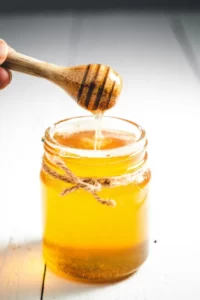Table of Contents
Manuka honey is a popular type of honey that has gained attention for its potential health benefits. One of the claims often made about manuka honey is that it can help with allergies. In this article, we will explore the truth behind this claim and delve into the world of manuka honey.
What is Manuka Honey?
Manuka honey is a type of honey that is produced by bees that feed on the nectar of the manuka tree, which is native to New Zealand and Australia. Chemically, manuka honey has unusually high levels of methylglyoxal, a compound that gives it strong antimicrobial properties.
The Myth of Manuka Honey for Allergies
Many people believe that consuming local honey, including manuka honey, can help alleviate symptoms of pollen allergies. The theory is that by ingesting honey made from local plants, you can build up a tolerance to the pollen and reduce your allergy symptoms. However, this claim is not supported by scientific evidence.
According to the Asthma and Allergy Foundation of America and the National Institutes of Health, there is no reason to think that honey, including manuka honey, can help with allergies. Allergies are caused by pollen from wind-pollinated plants, not insect-pollinated plants like those that produce honey. Therefore, the pollen found in honey is not the type that causes allergies.
Any perceived benefits of consuming honey for allergies are likely due to the placebo effect. While there are nutrients in bee pollen that may be beneficial, the clinical benefits have not been proven, and it is important to ensure that any bee pollen products you consume have not been adulterated or contaminated.
The Health Benefits of Honey
While honey, including manuka honey, may not help with allergies, it does offer other health benefits. Honey is considered healthier than other sweeteners, as it contains more than just sugar. It has antimicrobial properties and contains various nutrients that make it a useful ingredient beyond just providing sweetness.
However, it is important to note that honey is still a sweetener and should be consumed in moderation. It is high in calories and carbohydrates, so it should be used sparingly, especially for individuals with diabetes or those watching their sugar intake.
The Truth about Manuka Honey
Despite the hype surrounding manuka honey, there is likely more similarity in the health benefits of all honeys compared to table sugar than there are differences among honey types. While manuka honey has been extensively researched and marketed for its antimicrobial properties, the benefits of consuming it are less clear.
It is worth noting that there is a significant amount of counterfeit or fake manuka honey on the market. Due to its high price and demand, some unscrupulous sellers may label their honey as manuka honey when it is not. Therefore, it is important to purchase manuka honey from reputable sources to ensure its authenticity.
Conclusion
In conclusion, while manuka honey may have some unique properties, there is no scientific evidence to support the claim that it can help with allergies. Allergies are caused by wind-pollinated plants, and honey is produced from nectar collected by bees from insect-pollinated plants. Any perceived benefits are likely due to the placebo effect.
However, honey, including manuka honey, does offer other health benefits and can be a healthier alternative to other sweeteners. It is important to consume honey in moderation and purchase manuka honey from reputable sources to ensure its authenticity.
For more information about manuka honey and its various uses, visit https://aboutmanukahoney.com.



